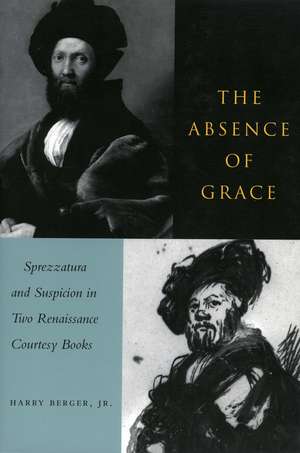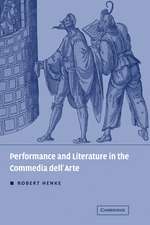The Absence of Grace: Sprezzatura and Suspicion in Two Renaissance Courtesy Books
Autor Jr. Harry Bergeren Limba Engleză Paperback – 30 sep 2000
The Absence of Grace is a study of male fantasy, representation anxiety, and narratorial authority in two sixteenth-century books, Baldassare Castiglione's Il libro del Cortegiano (1528) and Giovanni Della Casa's Galateo (1558). The interpretive method is a form of close reading the author describes as reconstructed old New Criticism, that is, close reading conditioned by an interest in and analysis of the historical changes reflected in the text. The book focuses on the way the Courtier and Galateo cope with and represent the interaction between changes of elite culture and the changing construction of masculine identity in early modern Europe. More specifically, it connects questions of male fantasy and masculine identity to questions about the authority and reliability of narrators, and shows how these questions surface in narratorial attitudes toward socioeconomic rank or class, political power, and gender.
The book is in three parts. Part One examines a distinction and correlation the Courtier establishes between two key terms, (1) sprezzatura, defined as a behavioral skill intended to simulate the attributes of (2) grazia, understood as the grace and privileges of noble birth. Because sprezzatura is negatively conceptualized as the absence of grace it generates anxiety and suspicion in performers and observers alike. In order to suggest how the binary opposition between these terms affected the discourse of manners, the author singles out the titular episode of Galateo, an anecdote about table manners, which he reads closely and then sets in its historical perspective. Part Two takes up the question of sprezzatura in the gender debate that develops in Book 3 of the Courtier, and Part Three explores in detail the characterization of the two narrators in the Courtier and Galateo, who are represented as unreliable and an object of parody or critique.
The book is in three parts. Part One examines a distinction and correlation the Courtier establishes between two key terms, (1) sprezzatura, defined as a behavioral skill intended to simulate the attributes of (2) grazia, understood as the grace and privileges of noble birth. Because sprezzatura is negatively conceptualized as the absence of grace it generates anxiety and suspicion in performers and observers alike. In order to suggest how the binary opposition between these terms affected the discourse of manners, the author singles out the titular episode of Galateo, an anecdote about table manners, which he reads closely and then sets in its historical perspective. Part Two takes up the question of sprezzatura in the gender debate that develops in Book 3 of the Courtier, and Part Three explores in detail the characterization of the two narrators in the Courtier and Galateo, who are represented as unreliable and an object of parody or critique.
| Toate formatele și edițiile | Preț | Express |
|---|---|---|
| Paperback (1) | 196.44 lei 3-5 săpt. | |
| Stanford University Press – 30 sep 2000 | 196.44 lei 3-5 săpt. | |
| Hardback (1) | 704.61 lei 6-8 săpt. | |
| Stanford University Press – 30 sep 2000 | 704.61 lei 6-8 săpt. |
Preț: 196.44 lei
Nou
Puncte Express: 295
Preț estimativ în valută:
37.59€ • 39.43$ • 31.29£
37.59€ • 39.43$ • 31.29£
Carte disponibilă
Livrare economică 11-25 martie
Preluare comenzi: 021 569.72.76
Specificații
ISBN-13: 9780804739054
ISBN-10: 0804739056
Pagini: 288
Dimensiuni: 152 x 229 x 18 mm
Greutate: 0.4 kg
Ediția:1
Editura: Stanford University Press
Colecția Stanford University Press
ISBN-10: 0804739056
Pagini: 288
Dimensiuni: 152 x 229 x 18 mm
Greutate: 0.4 kg
Ediția:1
Editura: Stanford University Press
Colecția Stanford University Press
Recenzii
"This brilliant book presents a carefully argued set of theses about Castiglione's Il libro del Cortegiano and Della Casa's Il Galateo that should have a significant impact not only on scholarship about these two books and the courtesy book tradition of the Renaissance, but on scholarship about the Renaissance in general."—Wayne A. Rebhorn, University of Texas, Austin
"This book not only fulfills the long-standing need for a comprehensive study in English of della Casa's short but powerful treatise, but it will also undoubtedly have an impact on criticism of Castiglione and of the Italian court culture similar to that of classics such as Wayne Rebhorn's Courtly Performances, J.R. Woodhouse's Balesar Castiglione: A Reassessment of 'The Courtier,' and Robert Hanning and David Rosand's edition of the influential set of essays etitled Castiglione: The Ideal and the Real in Renaissance Culture. . . . [A] praiseworthy methodological achievement."—South Atlantic Review
"[The Absence of Grace] is based on extremely careful readings of the two texts, and Berger displays his familiarity with the works while including enough citations to orient the reader. This book will be most useful to students of readings and texts in the Renaissance, and it also offers a valuable perspective on the literary production of court society in early modern Europe as a whole."—Sixteenth Century Journal
Notă biografică
Harry Berger, Jr. is Professor Emeritus of Literature and Art History at the University of California, Santa Cruz. He is the author, most recently, of Fictions of the Pose: Rembrandt Against the Italian Renaissance (Stanford, 1999).
Textul de pe ultima copertă
“This brilliant book presents a carefully argued set of theses about Castiglione’s Il libro del Cortegiano and Della Casa’s Il Galateo that should have a significant impact not only on scholarship about these two books and the courtesy book tradition of the Renaissance, but on scholarship about the Renaissance in general.”—Wayne A. Rebhorn, University of Texas, Austin
“This book not only fulfills the long-standing need for a comprehensive study in English of della Casa’s short but powerful treatise, but it will also undoubtedly have an impact on criticism of Castiglione and of the Italian court culture similar to that of classics such as Wayne Rebhorn’s Courtly Performances, J.R. Woodhouse’s Balesar Castiglione: A Reassessment of ‘The Courtier,’ and Robert Hanning and David Rosand’s edition of the influential set of essays etitled Castiglione: The Ideal and the Real in Renaissance Culture. . . . [A] praiseworthy methodological achievement.”—South Atlantic Review
“This book not only fulfills the long-standing need for a comprehensive study in English of della Casa’s short but powerful treatise, but it will also undoubtedly have an impact on criticism of Castiglione and of the Italian court culture similar to that of classics such as Wayne Rebhorn’s Courtly Performances, J.R. Woodhouse’s Balesar Castiglione: A Reassessment of ‘The Courtier,’ and Robert Hanning and David Rosand’s edition of the influential set of essays etitled Castiglione: The Ideal and the Real in Renaissance Culture. . . . [A] praiseworthy methodological achievement.”—South Atlantic Review






















